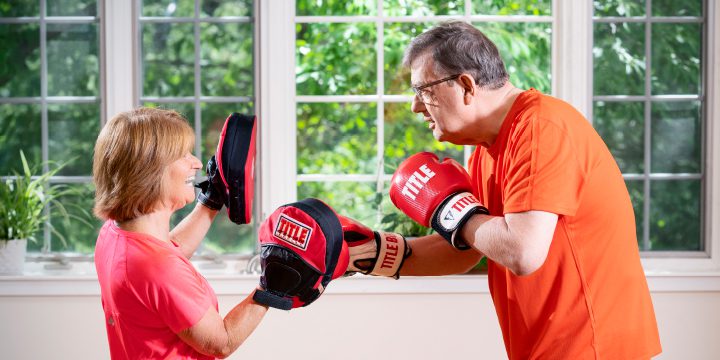As the world watched the opening ceremony of the 1996 Olympic Games, they saw the boxer considered to be the greatest heavyweight of all time — Muhammad Ali — struggling to hold the torch and light the Olympic flame. He’d been diagnosed with Parkinson’s disease at age 42, and many believed boxing was to blame.
So, it’s not without some measure of irony that today, a training program based on boxing fundamentals has become a beacon of hope for people living with Parkinson’s. The program is called Rock Steady Boxing, and it’s one of many innovative approaches to wellness and improved quality of life offered to residents at Edgewood LifeCare Community in North Andover, Massachusetts.
About Parkinson’s disease
Parkinson’s disease is a chronic, progressive movement disorder of the nervous system. Its cause is unknown but thought to be associated with a chronic deficiency in dopamine, which triggers increasing muscle stiffness, difficulties with speaking, fatigue, dizziness and a loss of coordination and balance. Movements become slow. Tremors appear. Falling is a big problem, especially as symptoms progress. And, unfortunately, there’s currently no cure.
The Origin of Rock Steady Boxing
At age 40, Scott Newman, an attorney in Marion County, Indiana received his own diagnosis of early-onset Parkinson’s disease. He discovered that boxing workouts helped him manage his symptoms. In 2006, in a tiny gym in Indianapolis, he founded Rock Steady Boxing. Since then, this non-contact, boxing-style regimen for fitness and emotional support has proven to be an effective management tool for people living with Parkinson’s. To date, there are some 871 Rock Steady Boxing programs around the world, with 43,500 participant Parkinson’s boxers training at them.
There are four levels of training tailored to different degrees and progressions of the disease. While exercise helps everybody, what’s exciting about this specific form of exercise for people with Parkinson’s disease is that preliminary studies show it has an impact on the brain itself. The hope is that Rock Steady Boxing is, in fact, slowing the progression of disease.
Boxing vs. Rock Steady Boxing
It’s important to clarify that, in Rock Steady Boxing, class participants don’t take punches; they only practice delivering them. It’s not a competition. Everyone does what they can and the program challenges everyone. Boxing’s varied, high-intensity workouts offer a blend of strength and cardiovascular conditioning that improves agility, coordination, and balance, which may be especially beneficial for people with neurological disorders like Parkinson’s disease.
Boxing also requires the body to move in all planes of motion in continuous variation throughout the workout. In this way, Rock Steady Boxing helps people with Parkinson’s become accustomed to movement adaptation. The wide-legged stance of a boxer and the shifting center of gravity when throwing punches are perfect for improving balance and posture. The sessions improve overall fitness, reaction time and balance, through workouts that include cardio, strength training, stretching, bag work, calisthenics, and core training.
Social, emotional, and psychological benefits
According to one participant in the Rock Steady Boxing program at Newman’s gym in Indiana, Parkinson’s “robs you of your livelihood, your hopes, steals your life.” But the hope offered by Rock Steady Boxing is precisely why it’s such an appropriate and valuable program for Edgewood residents living with Parkinson’s.
At Edgewood, we’re focused on empowering residents to remain in control of their lives, regardless of the challenges they may face. Because Parkinson’s disease specifically affects how a person moves, walks, and talks, it erodes confidence. People with Parkinson’s often withdraw from friends and family and limit their trips outside the home. They can easily feel lonely or isolated. But with Rock Steady Boxing, Edgewood is working to create an environment and provide support that helps residents with Parkinson’s overcome these feelings.
Offered as a group exercise class, Rock Steady Boxing sessions foster socialization and empowerment through partner and team exercises that promote inter-partner encouragement. In the largest survey to date* of Rock Steady Boxing and its effects on Parkinson’s disease impairments, nearly three-quarters of survey participants reported that the program improved their social lives, and more than half said it helped with fatigue, fear of falling, depression, and anxiety. In a sense, the program’s regular meetings and group participation serve as a mini support group.
Part of the culture of wellness at Edgewood
At Edgewood LifeCare Community, the approach to wellness is multidimensional. “We’re always searching for ways to empower full, active lives for all residents,” says wellness specialist Nancy Ryan, who leads the program at Edgewood, and is a trained RSB Coach. “That’s why we brought Rock Steady Boxing here in 2017.
“I love seeing the difference Rock Steady Boxing makes in the lives of Edgewood residents with Parkinson’s disease,” she says. “The exercises help improve balance and coordination, and I can customize the program for each individual’s abilities. It’s a supportive group program that boosts confidence, too. Participants can focus on freedom and being themselves in a safe, non-judgmental environment.”
It’s clear that residents in the program agree. In a note to Nancy, one resident participant wrote, “I’m getting so much out of the Rock Steady Boxing classes. I can walk better. I now shower without being afraid of falling. It’s made a huge difference for me.”
Discover the difference life at Edgewood can make for you or your loved one. Call 978.725.3300 to learn more and schedule a personal tour.

